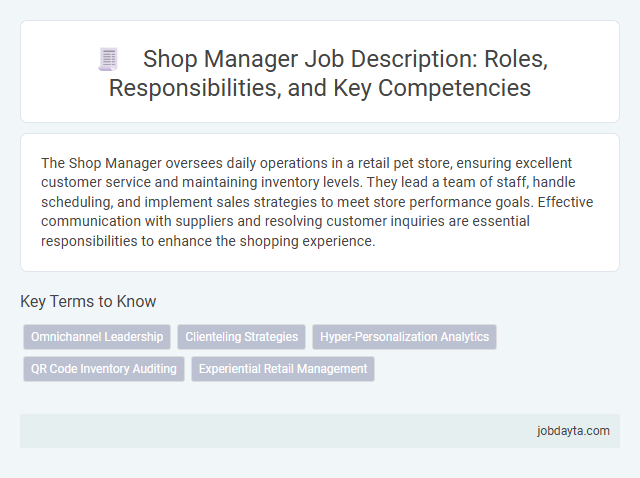The Shop Manager oversees daily operations in a retail pet store, ensuring excellent customer service and maintaining inventory levels. They lead a team of staff, handle scheduling, and implement sales strategies to meet store performance goals. Effective communication with suppliers and resolving customer inquiries are essential responsibilities to enhance the shopping experience.
Overview of a Shop Manager Role in Retail
What does a Shop Manager do in retail? A Shop Manager oversees daily store operations, ensuring smooth functionality and customer satisfaction. Your role involves managing staff, inventory, and sales performance to achieve business goals.
Core Responsibilities of a Shop Manager
The core responsibilities of a Shop Manager include overseeing daily store operations and ensuring a seamless customer experience. Managing inventory levels, staff schedules, and sales targets are crucial tasks that drive store success.
You lead the team by providing training, motivation, and performance feedback to maintain a productive workforce. Monitoring financial metrics and implementing promotional strategies help maximize store profitability and growth.
Essential Skills and Competencies for Shop Managers
Shop managers play a critical role in the retail industry by overseeing daily operations and ensuring customer satisfaction. Mastering essential skills and competencies drives store success and employee performance.
- Leadership Skills - Ability to motivate and guide a team to achieve sales targets and maintain store standards.
- Inventory Management - Proficiency in tracking stock levels, ordering merchandise, and reducing shrinkage.
- Customer Service Excellence - Expertise in addressing customer needs and resolving complaints to enhance shopping experience.
Daily Tasks and Operations Managed by Shop Managers
Shop managers play a crucial role in the daily operations of retail stores, ensuring smooth functioning and excellent customer service. They oversee various tasks to maintain store efficiency and meet sales targets.
- Staff Supervision - Shop managers coordinate and oversee the activities of sales associates and other store employees to maintain productivity and morale.
- Inventory Management - They monitor stock levels, organize replenishment, and manage deliveries to ensure product availability for customers.
- Customer Service Oversight - Shop managers address customer inquiries and resolve complaints to enhance the shopping experience and build customer loyalty.
Leadership and Team Management in Retail Shops
Shop managers play a crucial role in leading retail teams to achieve sales targets and enhance customer satisfaction. Effective leadership ensures smooth daily operations and motivates employees to perform at their best.
Strong team management skills help in resolving conflicts and fostering a positive work environment. Your ability to inspire and guide staff directly impacts store performance and customer loyalty.
Customer Service Management for Shop Managers
| Role | Shop Manager |
|---|---|
| Key Focus | Customer Service Management |
| Responsibilities |
|
| Skills Required | Strong communication skills, conflict resolution, leadership, empathy, problem-solving |
| Impact | Enhances customer loyalty, drives repeat business, and improves overall store reputation |
| Tip for Shop Managers | You should prioritize personalized customer experiences to build trust and encourage positive reviews. |
Inventory and Stock Control Responsibilities
The shop manager plays a critical role in maintaining accurate inventory records and ensuring optimal stock levels. Effective stock control prevents overstocking and stockouts, directly impacting sales and customer satisfaction.
They conduct regular inventory audits to identify discrepancies and update stock data promptly. The manager coordinates with suppliers to reorder products based on sales trends and seasonal demand. Implementing inventory management systems helps streamline stock tracking and reduces losses from shrinkage or spoilage.
Sales Targets and Performance Monitoring
The Shop Manager plays a crucial role in driving retail sales by setting clear sales targets aligned with business goals. Monitoring performance metrics ensures the team meets or exceeds these targets consistently.
- Sales Targets Setting - Establishing realistic and challenging sales goals based on market analysis and historical data.
- Performance Monitoring - Tracking daily and weekly sales figures to identify trends and areas for improvement.
- Team Motivation - Using performance data to motivate staff and implement strategies that boost sales.
Effective management of sales targets and performance monitoring enhances overall store profitability and customer satisfaction.
Health and Safety Compliance in Retail Shops
Shop managers play a crucial role in ensuring health and safety compliance within retail shops. They implement safety protocols to protect employees and customers from potential hazards. Regular training and risk assessments help maintain a secure shopping environment and adhere to regulatory standards.
Career Path and Advancement Opportunities for Shop Managers
Shop Managers play a crucial role in retail operations, overseeing daily activities and ensuring customer satisfaction. Career advancement often leads to positions such as Regional Manager, Operations Manager, or Corporate Retail Manager. Your skills in leadership, inventory management, and sales analysis open doors to higher responsibilities and increased earning potential.
Related Important Terms
Omnichannel Leadership
Shop Managers skilled in omnichannel leadership drive seamless integration between online and physical store experiences, enhancing customer satisfaction and operational efficiency. Leveraging data analytics and cross-platform communication, they optimize inventory management and personalized marketing strategies to boost sales and brand loyalty.
Clienteling Strategies
Shop managers implement clienteling strategies by leveraging customer data to personalize interactions and enhance loyalty. Utilizing CRM tools and purchase history enables targeted promotions and tailored shopping experiences that drive repeat business and increase customer lifetime value.
Hyper-Personalization Analytics
Shop managers leverage hyper-personalization analytics to analyze real-time customer behavior and preferences, enabling tailored marketing strategies that increase engagement and boost sales. Integrating AI-driven insights with POS data helps optimize inventory management and enhance customer experience through customized promotions and recommendations.
QR Code Inventory Auditing
Shop Managers enhance retail efficiency by using QR Code Inventory Auditing to quickly track stock levels and reduce human error during inventory checks. This technology enables real-time data updates, improving accuracy in stock management and streamlining reorder processes.
Experiential Retail Management
Shop Managers in experiential retail management prioritize creating immersive and interactive customer experiences that drive engagement and brand loyalty. They leverage data-driven insights and innovative technologies to optimize store layouts, personalize service, and enhance shopper satisfaction.
Shop Manager Infographic

 jobdayta.com
jobdayta.com